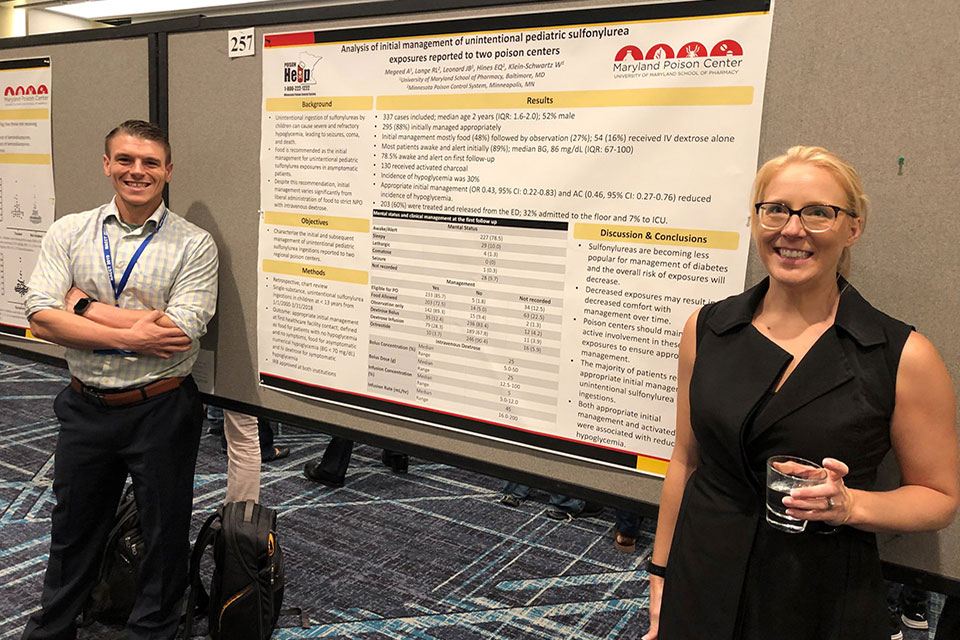MPC Showcases Expertise at National Toxicology Conference
October 22, 2019 Bruce Anderson
Posters and presentations highlight the breadth and depth of toxicology knowledge that spans the center’s staff.
The North American Congress of Clinical Toxicology (NACCT) is the premier conference that brings together pharmacists, physicians, nurses, and scientists from across the United States to share knowledge and gain new insights on a wide range of issues and topics in clinical toxicology. Each year, staff from the Maryland Poison Center (MPC) attend the conference not only to showcase the center’s original research, but also to learn from the research presented by other experts in the field.
This year, the MPC had a tremendous showing at the conference that included five posters and three presentations delivered by members of our team.
Posters
MPC staff collaborated with health care professionals from the School of Pharmacy, School of Medicine, and other institutions on the research presented in the following posters that were displayed during NACCT:
- Nicotine Pod Ingestions, A Clinical Conundrum: A Case Series
Authors: Elizabeth Millwee, BSN, RN, CSPI; Rebecca Mestas, PharmD, CSPI; and James Leonard, PharmD - The Penetration of Literature Describing Bupropion Related Harm After Overdose in the Non-Toxicology Related Literature: A Scoping Review
Authors: James Leonard, PharmD; Tiffany Buckley, PharmD, BCPS; Emily Gorman, MLIS, AHIP; and Wendy Klein-Schwartz, PharmD, MPH
- Assessment of Weight-Based Dose Resulting in Toxicity After Unintentional Pediatric Ingestions of Amphetamines
Authors: James Leonard, PharmD; Amy Kruger Howard, PharmD; and Elizabeth Quaal Hines, MD - Analysis of Initial Management of Unintentional Pediatric Sulfonylurea Exposures Report to Two Poison Centers
Authors: Ayaa Megeed, BS; Becca Lange, PharmD, BCPS, CSPI; James Leonard, PharmD; Elizabeth Quaal Hines, MD; and Wendy Klein-Schwartz, PharmD, MPH
- Treatment of Congenital Lead Poisoning with Succimer
Authors: Minna Leydorf, MD; Ankur Vaidya, MS; Paige Luneburg, MD; and Elizabeth Quaal Hines, MD
Presentations
Staff members Elizabeth Hines, MD, former acting medical director of the MPC and assistant professor of pediatrics at the School of Medicine; and Emily Paterson, BS, CHES, public education and communication specialist for the MPC, also delivered oral presentations during the conference.
Hine’s presentation explored the effects of prenatal addiction on children from conception through early childhood. She spoke about the effects of common drugs of abuse on fetal development, explained how to interpret common neonatal drug screens, and provided tips to help listeners recognize the effects of common drugs of abuse on early childhood development.
Paterson’s presentation explored how health behavior theories can be leveraged to design and evaluate a poison prevention program. She discussed different health behavior theories that act as foundations for program planning and development, taught attendees how to apply the principles of health behavior theories to poison prevention program development, and offered an analysis of how these theories can help planners identify suitable audiences, methods for fostering change, and outcomes for evaluation.
I also had an opportunity to serve as moderator for an informative and engaging scientific symposium titled “Moonshine: Past, Present, Future.” I truly enjoyed my participation in the discussion, which gave me new insight into the history of moonshine and how it is intertwined with prohibition. In addition to describing the process of alcohol production and concerns for the home distiller, presenters contrasted the benefits of the evolution of the still with the risks of making moonshine.
Another Celebration of Staff Expertise
Shortly after returning from NACCT, staff at the MPC were again celebrating the expertise and achievements of one of our own — James Leonard, PharmD, who completed his examination to become a Diplomate of the American Board of Applied Toxicology (DABAT) two days before the conference kicked off in Nashville, Tenn. This prestigious credential is awarded by the same organization that hosts NACCT (the American Academy of Clinical Toxicology) and is awarded to non-physician clinical toxicologists who demonstrate exceptional knowledge, experience, and competence in the field.
The Quest for Continued Professional Development
Participating in conferences like NACCT is crucial to helping the MPC continue its mission to decrease the cost and complexity of poisoning and overdose care while maintaining and/or improving patient outcomes. Our staff and specialists are able to apply the new knowledge gained from these events directly to their interactions with patients, while also sharing important lessons they have learned through their own research and helping others improve outcomes for patients not only in Maryland, but also across the United States. As the executive director of the MPC, I am incredibly proud of the tremendous contributions that our staff made to this year’s conference, and I cannot wait to see what next year brings.